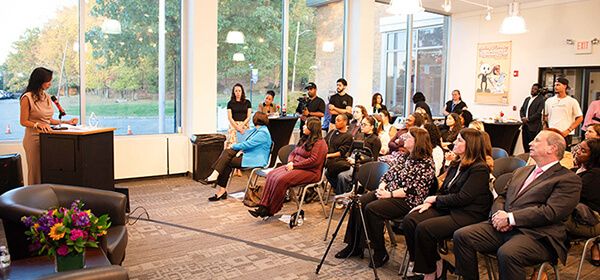Academic Service Learning
Berkeley College is pleased to offer students experiential learning opportunities that also provide services to nonprofit organizations. Students can take courses that are part of their degree programs in which their class will partner with a community organization. Student projects vary, depending on the course and the partner organization, and may involve
- Developing marketing materials
- Planning and executing an internal control audit
- Preparing a volunteer recruitment plan for an organization.
Class projects are designed to meet the course objectives, teach students about the importance of community service, and promote the business aspects of nonprofit organizations. Students earn credits for their coursework and complete the class with the satisfaction of knowing they made a valuable contribution to their partner organization and to the community.
Previous Academic Service Learning partners include Gilda's Club, FDNY Burn Center Foundation, Metro New York American Red Cross, Eva's Village, Jewish Home Life Care Nursing Home, The North Jersey Community Research Foundation, Clifton Art Center, Paterson Museum, The Shakespeare Theatre of New Jersey, Casa Linda (Mexico) and Food Bank for Westchester.
To register for Academic Service Learning courses and for further information, please contact your Dean of Academic Advisement.
Frequently Asked Questions: Academic Service Learning
What is Academic Service Learning?
It is a classroom-based program that involves students in some form of required community service and uses that activity as a means of understanding course concepts. It is a pedagogical approach whereby students engage in a service activity that benefits the common good. It is learning-by-doing.
What is the service learning pedagogy?
Service learning is a type of experiential learning that engages students in service within the community as an integrated aspect of a course. Students participate in an organized activity and reflect on that activity to gain further understanding of course content; a broader appreciation of the discipline; and an enhanced sense of personal values and civic responsibility. Service Learning engages students in active, collaborative, and inquiry-based learning experiences to meet identified needs of an organization or community at large.
What are the goals of Academic Service learning?
The goals of Academic Service learning are:
- To blend service and learning goals and activities in such a way that the two reinforce each other and produce a greater impact than either could produce alone
- To enhance students’ learning by enabling them to practice skills and test classroom knowledge through related service experiences in a non-profit organization
- To enable students to provide needed assistance to community agencies
What are the key elements of ASL?
The critical elements of ASL are:
- Meaningful service to community
- Clearly conceptualized connection between courses’ objectives and service activities
- Structured opportunities for students to synthesize and derive new meaning from their experiences as they relate those experiences to course goals and objectives
What are the benefits to students who take ASL courses?
- Hands-on use of skills and knowledge
- Increased relevance of academic skills
- Opportunities that accommodate different learning styles
- Increased analytical skills
- Increased civic responsibility
- Better prepared graduates to face real world market
- Opportunity to develop as effective leaders and engaged citizens
What are the benefits to the community from the ASL program?
- Awareness-building of community issues, agencies, and constituents
- Opportunities to contribute to the educational process
- Short- and long-term solutions to community needs
- Positive community relationships
How is Academic Service Learning different from volunteer work?
The actual work you do at an agency might not be different from what you would have done as a volunteer. However, your approach to the work is different in the ASL program. You will be looking at the place, the people, your experiences, and your reactions to find out deeper meaning that relate to your course content. You learn something about the course you are taking by working in the community.
What kind of projects do students do in an ASL course?
It depends on the course you take and the partner organization. It may involve:
- Developing marketing materials
- Planning and executing an internal control audit
- Preparing a volunteer recruitment plan
- Developing a business plan
What are some of the organizations that Berkeley has partnered with for ASL projects?
- American Conference on Diversity - NJ
- American Red Cross – NY, NJ, WST
- Covenant House - NY
- Eva’s Village - NJ
- FDNY Burn Center Foundation - NY
- Gilda’s Club - NJ
- Girl Scouts of America
- Habitat for Humanity - NY, NJ
- Jewish Home Life Care - NY
- New Jersey Community Research Institute
- Partnership for the Homeless and Encore - NY
- Paterson Museum and Clifton Arts Center - NJ
- The Strategy Network - NJ
Still have questions? Visit our Live Chat at www.berkeleycollege.edu to speak with a representative.




